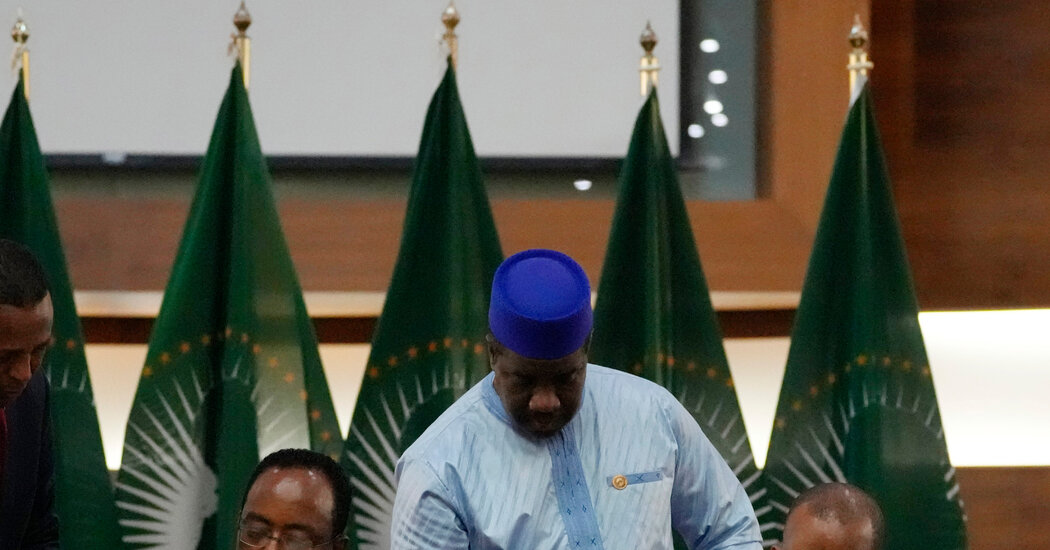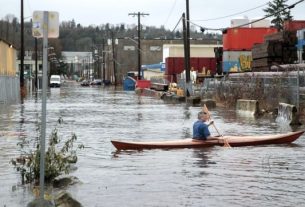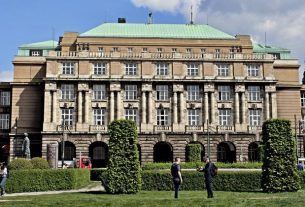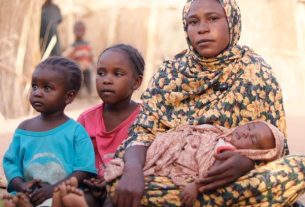For two years, Ethiopia has been at war with itself.
Fighting there has killed hundreds of thousands of people and displaced millions more in Africa’s second-most-populous country, a scale of conflict that some have compared to that in Ukraine.
But a surprise cease-fire aims to pause the violence, and one side said it had pulled back nearly two-thirds of its troops from the front lines in recent weeks. I spoke to Abdi Latif Dahir, the East Africa correspondent for The Times, who has reported on the war, about what the peace deal means for Ethiopia.
Lauren: Ethiopia went from being one of the most prosperous nations in Africa to the site of a brutal civil war. How did it get there?
Abdi: The story starts in northern Ethiopia, in a region called Tigray. It’s home to an ancient kingdom, filled with jagged mountains and sesame fields.
The Tigrayan ethnic group is a small fraction of the country’s population of almost 120 million people. But for the past few decades, Tigrayans controlled Ethiopian politics. Their party, the Tigrayan People’s Liberation Front, dominated the ruling coalition in Ethiopia’s parliament.
Their rule was defined by both immense economic progress, but also a lot of repression. The authorities jailed journalists and cracked down on the opposition. They also made enemies with Eritrea, a neighbor that they fought over a disputed border town. In 2018, after nationwide protests demanding political reform, the prime minister of the ruling coalition that was dominated by the T.P.L.F. resigned.
After he resigned, Abiy Ahmed, a member of Ethiopia’s parliament, rose to power and quickly won a Nobel Peace Prize. Tell me about him.
I was in a cab in the Ethiopian city of Bahir Dar after Abiy became prime minister. My driver was so excited that he followed me out of the car after the ride was over, standing on the street to keep telling me Abiy’s story. He was one of Africa’s youngest leaders, just 41, and everybody thought he was going to change the country. He did.
After Abiy took control he won a Nobel Peace Prize, in part for brokering an agreement with Eritrea. He also removed Tigrayans from government positions in an effort to weaken their power. Then tensions rose with the group.
In November 2020, Abiy sent troops into Tigray after he accused T.P.L.F. forces of attacking a federal military base there. But what started as a quick incursion turned into one of the bloodiest conflicts in the world.
How did the war devolve so quickly?
Abiy wanted to ensure the Tigrayan forces were defeated. He called the T.P.L.F. “cancer” and “weeds” that needed to be rooted out. That kind of dehumanizing talk was a shock to many people across the continent.
Other regional actors harboring resentment against Tigrayans or driven by other interests soon joined in the fight. Eritreans allied with Ethiopian forces. Militias made up of Amharas, the country’s second-largest ethnic group, also began killing Tigrayans and were accused of committing massacres in several towns. Tigrayan forces responded violently.
Can you give me a sense of the scale of devastation?
It’s sad to even speak about. Tigray was once one of the most developed regions in Ethiopia, filled with universities and bustling businesses. There were bookshops and beekeepers. Everything was destroyed.
The Ethiopian government shut down the internet, cutting the region off from the world. Journalists have had to rely on satellites and limited reporting to understand the conflict. But acts of ethnic cleansing have been well documented, committed not just by the government and Eritrean forces, but also by the Tigrayans.
The U.S. government estimates as many as 500,000 people have been killed. Allegations have surfaced of children being recruited as soldiers. The warring parties have used starvation and rape as weapons of war. And millions who survived were displaced.
Is there a story that sticks with you from your reporting?
Early in the war, I met a Tigrayan refugee in Sudan. He told me how a militia tied a noose around his neck and dragged him behind a motorcycle for hours, then left him for dead. He woke up later and stumbled his way to safety. I still think about him.
I also think about the Sudanese town where he found refuge. It’s called Hamdayet, across the border from Tigray. When refugees arrived, people gave them jobs and even their own homes. Many times, we cover negative stories across Africa. But that town gave me hope.
Last month, the Tigrayans and the Ethiopian government reached a cease-fire. How did that happen?
The war was intensifying, and Ethiopian forces captured several major towns in Tigray. After months of stonewalling, they were now ready to accept entreaties to come to the table.
After a few days, the parties finally announced an agreement. The cease-fire called for Tigrayan forces to disarm within a month, and for Ethiopian forces to take over airports and government facilities within Tigray. There was a clear winner.
Is this cease-fire going to hold?
The T.P.L.F. said it withdrew 65 percent of its forces from the front lines. Party officials said they will not fully demobilize until Eritrea withdraws, as the Tigrayans are worried about ongoing attacks from their northern neighbor. So the question of Eritrea is hanging over this crisis.
What is next for Ethiopia?
The Ethiopian government has been trying to defeat Tigray forces for years, using every tool of war to decimate them. What does justice and reconciliation look like? How does Tigray economically recover? How can Ethiopia rejoin the rest of the world?
Ethiopia is home to the headquarters of the African Union. It is the only country on the African continent that was never colonized. Before the war, Ethiopia held a huge significance for Africans. It’s still significant, but for an entirely different reason.
Abdi Latif Dahir is based in Nairobi, and has covered East Africa for The Times since 2019. He grew up in Mogadishu and has 21 siblings. Together, they could field two full soccer teams.
NEWS
International
-
Cuba is facing its biggest exodus in a generation as hundreds of thousands of people flee an economy decimated by the pandemic and U.S. sanctions.
-
The Belgian police detained five people, including members of the European Parliament, in an investigation of suspected bribes by Qatar.
-
“You can only trust me”: Vladimir Putin projected control in a string of public appearances even as he told Russians to prepare for a long war.
Other Big Stories
WORLD CUP
Transcontinental pride: Morocco defeated Portugal 1-0, becoming the first country in Africa and in the Arab world to reach the semifinals in the tournament’s history.
Missed chance: Cristiano Ronaldo will likely end his career without winning a World Cup.
Reigning champions: France beat England 2-1 to advance. A missed penalty kick will likely haunt England’s captain, Harry Kane.
FROM OPINION
Dr. Anthony Fauci hopes to inspire the next generation of health experts by sharing his story of love of science and discovery.
As Laurent Dubois cheers for the French men’s soccer team, he also roots for a France that ultimately confronts and embraces its complex histories.
Americans do not have to accept that the worst of gun culture becomes pervasive in our politics, The Times’s editorial board argues.
The Sunday question: Why did Senator Kyrsten Sinema leave the Democratic Party?
Sinema’s switch was a repudiation of party leaders who let activists harass her, Jim Geraghty writes in The National Review. But in the New Republican, Alex Shephard argues the move is “blessedly uncomplicated”: She’s trying to avoid a primary.
MORNING READS
“The White Lotus”: This season focuses on the willful delusion of the wealthy.
Read the full issue.
THE WEEK AHEAD
What to Watch For
-
NASA’s Orion spacecraft, which launched last month as part of the Artemis I moon mission, is scheduled to return to Earth around 12:40 Eastern today. Here’s how to watch.
-
Sam Bankman-Fried, the founder of the collapsed cryptocurrency exchange FTX, said he would testify before the House Banking Committee on Tuesday.
-
The first World Cup semifinal is on Tuesday, when Argentina meets Croatia, and the second on Wednesday, between Morocco and France.
-
The Federal Reserve will meet on Wednesday and is expected to announce another increase in interest rates to help fight inflation.
-
The winner of the Miss America pageant will be crowned on Thursday.
-
Congress has until Friday to reach an agreement on a spending package to avoid a government shutdown.
What to Cook This Week



